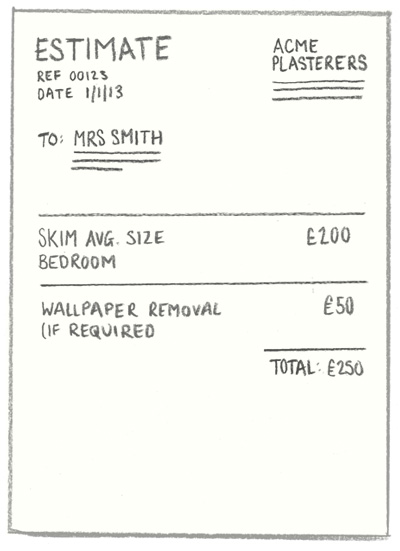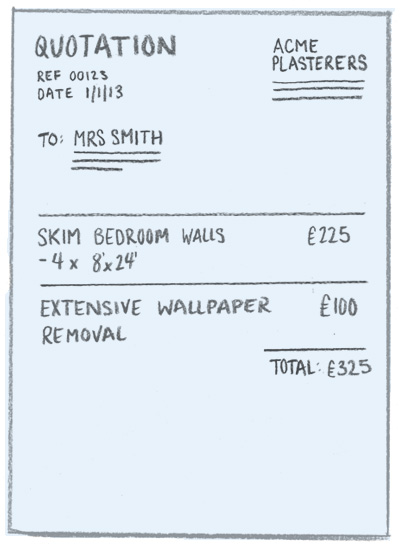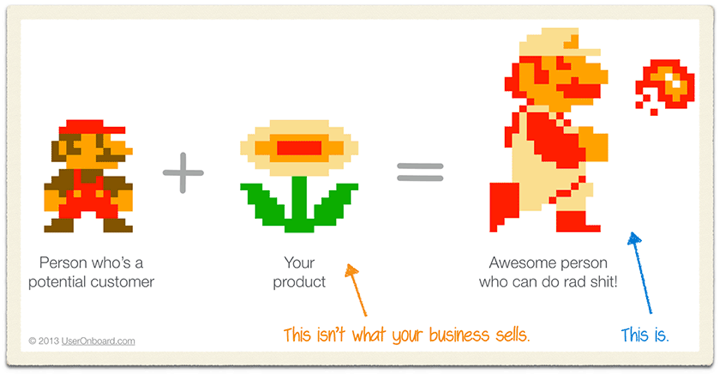
Writing quotes can be very time-consuming. Very few builders enjoy quoting and costing new work, but it’s essential for keeping the work flowing through your business.
So, how do you more easily write quotes that win you work?
Quoting new building work takes time and effort, so maximising your chance of winning that work means less chance of wasted time and effort.
For you and your builders business, quoting keeps work flowing and sets customer expectations on what you’re delivering from the start.
For homeowners, quotes are peace of mind and a critical tool for deciding who to award the work to. The Citizens Advice Bureau considers getting a written quote from builders a top tip for homeowners, Whilst The Homeowners Alliance goes a step further and recommends written quotes as a way to avoid rogue tradesmen:
Never accept a verbal quote, except perhaps for the very smallest jobs that are just a few hours work. Always get a written quote for the job, detailing the costs for the brief.
There’s little doubt that quotes are important, but how can you make writing (great) builders quotes more effective?
When should you write your quote?
Paperwork is usually the #1 frustration amongst builders running their own business. It’s safe to say that invoicing and getting paid isn’t that frustrating, so most of this frustration must stem from quoting.
Surveys suggest 84% of customers are frustrated with the speed and quality of quotes from builders. Tweet this
If you’re spending your time make sure it’s got a great chance of paying off – and while you’re there, make sure you giving great quotes to your customers!
Q: When should I write my building quote for my customer?
A: Just as quickly as you can!
Producing a speedy quote is a chance to showcase how your business will perform if you win the job. Quoting quicker can give you a competitive edge, but can also free up your time (and save you stress).
Think about how quoting currently fits into your day: chances are, you’re surveying new work, then creating your quotes once you’re home in the evening. Or worse, you might be letting quotes build up until later in the week.
That means finding time to sit down to complete more quotes or estimates in one go – at the expense of switching off or spending time with your family. It will also mean you’re quoting for work when it’s not fresh in your mind, which runs a risk of forgetting details or customer requests.
How much easier if you were quoting for the majority of work whilst surveying it? Or even within a few hours?
You could be getting quotations completed without sacrificing your social time, your customers would be super-impressed, and it would also mean you’re not stressing yourself out by stockpiling paperwork to complete at some later date.
Being able to produce quotes quickly – and whilst you’re on the road – requires just a little planning and using some smart tools (there are Estimating software for the building trade to help get you started).
How do you write your quote?
What kind of quote-writer are you? Here’s our quick run-down of how you might be doing things:
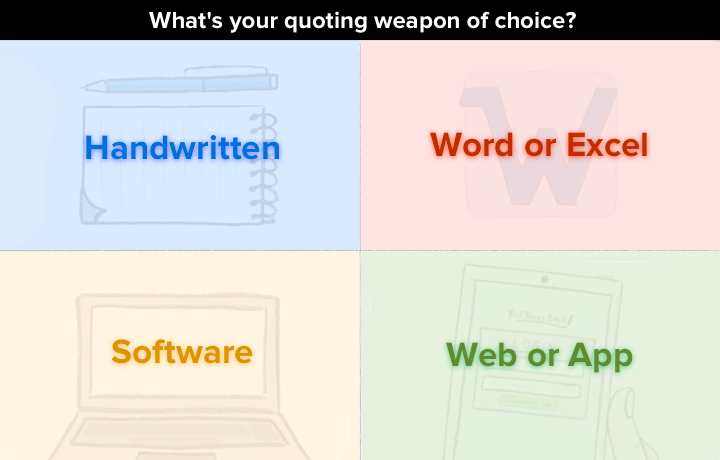
Handwritten |
|
| Pros | Cons |
|---|---|
|
|
Word or excel |
|
| Pros | Cons |
|---|---|
|
|
Installed software |
|
| Pros | Cons |
|---|---|
|
|
Web-based software |
|
| Pros | Cons |
|---|---|
|
|
What’s your quotation tool of choice?
Builders quote or estimate?
A question to consider when providing a written price for your customers; should you provide a quote or estimate?
To decide what’s best for you – and your customer – consider the difference between a builders quote vs. estimate. We’ve written a quick guide for tradesman on quotes vs estimates, but here’s a quick recap for builders:
|
|
There’s more advice for homeowners on the difference between estimating and quoting available on the Citizens Advice Bureau website.
Your customers will care whether the price you’re providing is accurate or just an estimate, so being clear on what you’re providing (and if relevant, why) will build trust with your customer and ensure expectations are set from the start.
What should you include in your builders quote?
What would your customer expect to find on your written quote?
Here’s a checklist of questions to consider when writing your builder quote or estimate:
General quote details to include
- Is this a quote or an estimate?! Refer to the above and ensure you’ve clearly marked which you’re providing.
- Is there a reference number? An optional inclusion – including a reference number is handy if you’re producing a lot of quotes and need to identify which your customer is referring to with any enquiries.
- Who is this quote for? Address your customer in the quotation.
- How long is the quote valid for? Including a date is very important if you’re only prepared to complete the work quoted within a set time period. Stating a validity period can also add some gentle urgency, with your customers knowing they have a time limit on making a decision.
Breakdown of work being quoted
- What work is involved? Detailed account of the work required. By providing a breakdown of the work included, you’ll avoid confusion in the future and give your customer peace of mind about what they’re getting – and for how much!
- Have I included all the relevant work detail?
- What’s the total price? Total price including any Tax or VAT breakdown
- Am I breaking down the cost? Does your customer want to see a breakdown of all the materials and work line-by-line or is a total cost suitable?
Relevant terms and other details
- Deposit required? Let your customer know what your payment schedule is and if any deposits are required to get started.
- What’s next for your customer? Make sure you’re communicating what your customer needs to do if they want to progress with the work… there’s no point in spending time and energy quoting, just to leave them asking “what now?”.
- Have I crossed my t’s and dotted my i’s? Are my terms and conditions included – or at the least, have you told your customer where they can get a copy to review? What about any relevant VAT, company or trade association numbers – have those been provided?
- Have I sold myself? Including any trade associations, memberships or accreditations is a great way to promote trustworthiness. Customer testimonials can also be relevant when your customers are reviewing your quoted price, so this is a great time to include those, too.
How much detail should you include?
By providing plenty of detail for the building work you’re completing, you don’t leave your customer guessing which work is included and which isn’t. It also serves as a clear outline of exactly what work you plan to complete to avoid confusion or arguments later.
You vs. the competition: When deciding how much detail to include, consider how much detail your competitor might be included in their quote. Your quotation will be a factor in who your customer decides should do the work (and not just because of the price). More detail probably wins in gaining trust and peace of mind with the customer.
It’s also important to consider how you detail the work your customer will get. Customers don’t buy your building skills and expertise, they buy the work you’ll be completing. Focus what you’re selling based on what you’re customer will benefit from.
As marketing expert Samuel Hulick says:
People don’t buy products; they buy better versions of themselves. When you’re trying to win customers, are you listing the attributes of the flower or describing how awesome it is to throw fireballs?
Focus on the benefits of the work you’re quoting for, not just what you’re going to do. What will your customer gain by having you complete that work? That’s what they’re buying, so that’s what you should be selling.
What else should you include when writing an estimate?
Be clear the cost you’re providing is an estimate, and wherever possible, outline where the amount (and cost) of work might increase.
Although there’s no legal obligation to state this much detail, it’s courteous and sets expectations from the start. Be clear and build trust with your customer for a smoother job.
5 Rules for for writing better quotes
Here’s our cut-out-and-keep guide to keep you on the right track when thinking about how your trades business quotes for new work: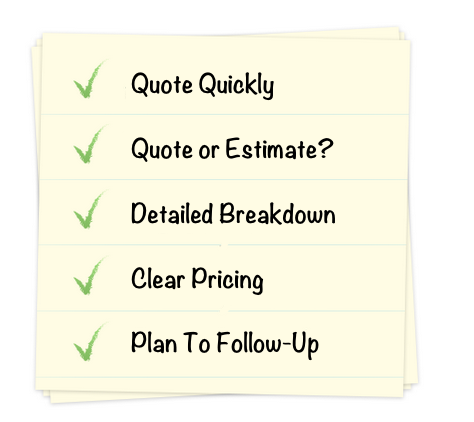
Quoting is vital to your business, making it easier saves you time and gives your building business a greater chance of success.

